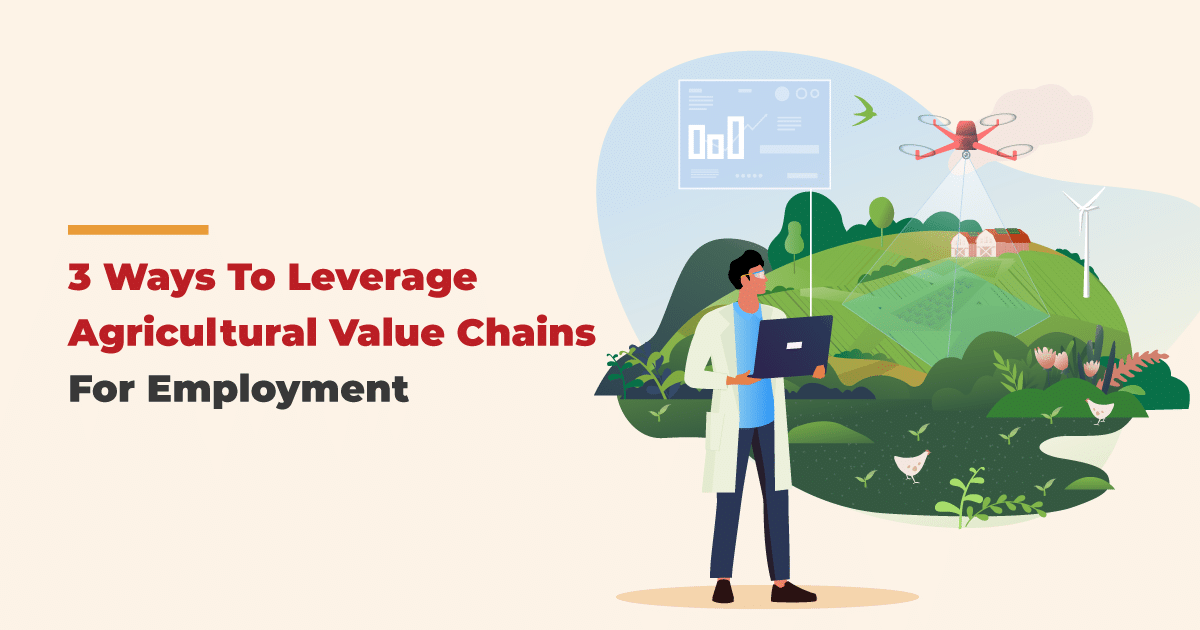Kenya has a large agricultural sector that employs a major proportion of the population, as high as 70 per cent in the rural areas. Despite this, there are still many unemployed people in the country. According to the World Bank, the youth account for approximately 35.4 per cent of the Kenyan population and 60 per cent of the total labour force, with an estimated 1.2 million youths entering the workforce every year. One way to address unemployment and create new job opportunities for the new job market entrants is to focus on the largest employing sector using a value chain approach.
Table of Contents
What are agricultural value chains and why are they important for Kenya’s employment sector?
An agricultural value chain defines the set of actors and activities that bring a basic agricultural product (animal and crop) from the production stage in the field to final consumption, where at each stage value is added to the product. This entails the different steps involved in growing the crop or animal, transportation, processing, marketing, distribution and final use of the finished product.
Agricultural value chains are conforming to rapidly changing and modernizing agri-food systems that are generating new consumption patterns and new production and distribution systems hence providing opportunities for quality employment at the different stages. For example, a value chain for maize would involve input suppliers and seed merchants, crop and animal researchers, farmers, village aggregating agents, wholesale buyers and other off-takers, transport service providers, warehouse and storage businesses, millers, and retailers. Each of these businesses creates jobs in order to carry out their operations.
As a country whose economy and employment patterns largely depend on agriculture, job creation along the value chains will play a big role in addressing unemployment.
What are some ways that job seekers can leverage agricultural value chains for jobs?
There are more than a few different ways to do this but here are three ways that agricultural value chains can be leveraged for more jobs in Kenya.
Access to information
Knowledge of how the domestic agricultural value chains work will be key in identifying rewarding employment opportunities, especially for the youth, either as skilled labour along the value chain or as self-employed entrepreneurs. Access to information will thus provide insight to help match the young people to lucrative business opportunities or appropriate job possibilities in the various stages of identified value chains.
Further, in the context of globalization and value chain integrations across countries, access to information on opportunities and how value chains work globally provides Kenyan job seekers with the chance to participate in global value chains and benefit from global labour trends as well as exposure to marketing intelligence presenting entry points into global supply chains.
Upskilling for relevance
To exploit the various opportunities presented by exposure and access to information, job seekers will have to align themselves with the demand of the value chains’ job markets. This will either be addressed by the acquisition of primary skills where one did not have any of the competencies on-demand or investment in getting new skills to complement existing ones and improve their competitiveness as job seekers or entrepreneurs along the value chain. This will need a constant evaluation of the job market in the agri-food sector compared to what skills are available in order to bridge any gaps by focusing on relevant skill development for the existing workforce, especially the youth.

A good example is digital marketing, which in recent years has become a key growth resource in agribusiness development. A marketing professional wanting to grow their career in tandem with the agri-food sector would need to familiarize themselves with digital marketing principles and practices thus expanding their employment options.
As a job seeker, pinpoint what skills are necessary to take up identified opportunities along the value chain in line with your selected career path, and if lacking in them, invest in upskilling yourself to be relevant to the job market.
Networking and continuous learning
Domestic and global agricultural value chains are constantly changing, driven by new innovations and practices to increase efficiency along the chains as well as to adapt to new consumer behaviour. Therefore, to inclusively participate in the chain either as an employee or entrepreneur, one has to be abreast with the ever-changing market dynamics, supplies, services needed and trade modalities that inform job market demand and business possibilities. It is then key for one to take advantage of networking platforms and opportunities to continuously augment knowledge on sector transformations and trends while tapping into the exchange of ideas and knowledge transfer. Follow captains of industry and persons of influence in the value chains and stay up to date on changing trends and priorities within the agri-food sector.
For all the above to happen, an enabling environment for value chain development has to be in existence involving government, private sector, development agencies and all stakeholders to ensure appropriate policies, infrastructural support, business development services and inclusivity.
We would like to hear your opinion.
Do you have any other ideas on how one can leverage agricultural value chains for career development? Let us know in the comments below.





